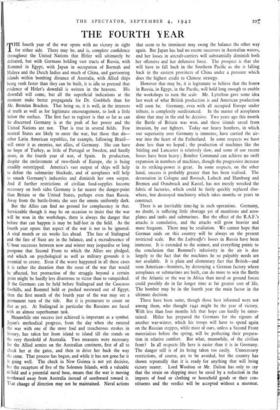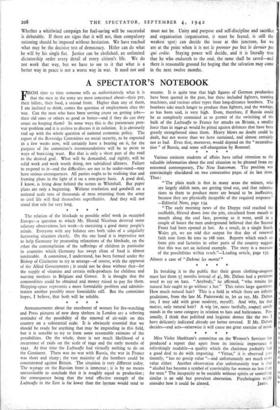THE FOURTH NEAR
THE fourth year of the war opens with no victory in sight for either side. There may be, and is, complete confidence throughout the United Nations that Hitler will ultimately be defeated, but with Germans holding vast tracts of Russia, with Rommel in Egypt, with japan in occupation of Burmah and Malaya and the Dutch Indies and much of China, and garrisoning islands within bombing distance of Australia, with Allied ships being sunk faster than they can be built, it is idle to pretend that evidence of Hitler's downfall is written in the heavens. His downfall will come, but all the superficial indications at the moment make better propaganda for Dr. Goebbels than for Mr. Brendan Bracken. That being so, it is well, in the interests of truth as well as for legitimate encouragement, to look a little below the surface. The first fact to register is that so far as can be discerned Germany is at the peak of her power and the United Nations are not. That is true in several fields. Few neutral States are likely to enter the war, but those that do— other Latin American republics, for example, following Brazil— will enter it as enemies, not allies, of Germany. She can have no hope of Turkey, as little of Portugal or Sweden, and hardly more, in the fourth year of war, of Spain. In production, despite the enslavement of two-thirds of Europe, she is being steadily outstripped. America's vast output of ships will help to defeat the submarine blockade, and of aeroplanes will help to smash Germany's industries and diminish her own output. And if further restrictions of civilian food-supplies become necessary on both sides Germany is far nearer the danger-point than Britain or the United States, perhaps even than Russia. Away from the battle-fronts she sees the omens uniformly dark.
But the Allies can find no ground for complacency in that. Serviceable though it may be on occasion to insist that the war will be won in the workshops, there is always the danger that before that can happen is may be half-lost in the field. As the fourth year opens that aspect of the war is not to be ignored. A vital month or six weeks lies ahead. The fate of Stalingrad and the fate of Suez are in the balance, and a recrudescence of U-boat successes between now and winter may jeopardise or long postpone that Second Front to which the Allies are pledged, and which on psychological as well as military grounds it is essential to create.. Even if the worst happened in all these cases it is rather the duration than the issue of the war that would be affected, but protraction of the struggle beyond a certain point might be hardly less disastrous to victor than to vanquished. If the Germans can be held before Stalingrad and the Caucasus foothills, and Rommel held or pushed westward out of Egypt, then the first month of the fourth year of the war may see a permanent turn of the tide. But it is premature to count on that as yet. At Stalingrad in particular the Russians are faced with an almost superhuman task.
Meanwhile one success just achieved is important as a symbol. Japan's methodical progress, from the day when she entered the war with one of the most foul and treacherous strokes in history, has taken her from island to island till she stands on the very threshold of Australia. Two measures were necessary for the Allied armies on the Australian continent, first of all to check her at the gates, and then to drive her back the way she came. That process has begun, and while it has not gone far it is going well. The check in New Guinea is not yet decisive, but the recapture of five of the Solomon Islands, with a valuable airfield and a potential naval base, means that the war is moving northward away. from Australia instead of southward toward it. That change of direction may not be maintained. Naval actions that seem to be imminent may swing the balance the other way again. But Japan has had no recent successes in Australian waters, and her losses in aircraft-carriers will substantially diminish both her offensive and her defensive force. The prospect is that she will have to fall back in the Southern Pacific as she is falling back in the eastern provinces of China under a pressure which does the highest credit to Chinese strategy.
However that may be, it is legitimate to believe that the fronts in Russia, in Egypt, in the Pacific, will hold long enough to enable the workshops to turn the scale. Mr. Lyttelton gave some idea last week of what British production is and American production will soon be. Germany, even with all occupied Europe under tribute, is completely outdistanced. In the matter of aeroplanes alone that may in the end be decisive. Two years ago this month the Battle of Britain was won, and these islands saved from invasion, by our fighters. Today our heavy bombers, in which our superiority over Germany is immense, have carried the air- war into the heart of the Fatherland. In some respects we have done less than we hoped ; the production of machines like the Stirling and Lancaster is relatively slow, and some of our recent losses have been heavy ; Bomber Command can achieve no swift expansion in numbers of machines, though the progressive increase in its striking-power is great. In some respects, on the other hand, success is probably greater than has been realised. The devastation in Cologne and Rostock, Lubeck and Hamburg and Bremen and Osnabruck and Kassel, has not merely wrecked the fabric of factories, which could be fairly quickly replaced else- where, but destroyed machinery which takes months or years to construct.
There is an inevitable time-lag in such operations. Germany, no doubt, is suffering little shortage yet of munitions and aero- planes and tanks and submarines. But the effect of the R.A.F.'s attacks is cumulative, and the attacks will grow heavier and more frequent. There may be retaliation. We cannot hope that German raids on this country will be always on the present restricted scale. But the Luftwaffe's losses in Russia have been immense. It is extended to the utmost, and everything points to the conclusion that Rommel's inferiority in the air is due largely to the fact that the machines he so palpably needs are not available. It is plain and elementary fact that British—and soon American—bombers, by destroying a German factory where aeroplanes or submarines are built, can do more to win the Battle of the Atlantic or the war in Africa than naval or ground forces could possibly do in far longer time at far greater cost of life. The bomber may be in the fourth year the main factor in the ultimate decision.
There have been some, though those best informed were not among them, who thought 1942 might be the year of victory. With less than four months left that hope can hardly be enter- tained. Hitler has prepared the Germans for the rigours of another war-winter, which his troops will have to spend again on the Russian steppes, while most of ours, unless a Second Front materialises before the spring, will be perfecting their prepara- tion in relative comfort. But what, meanwhile, of the civilian front? In all respects life here is easier than it is in Germany. The danger still is of its being taken too easily. Unnecessary restrictions, of course, are to be avoided, but the country has shown repeatedly that it is ready for anything that will bring victory nearer. Lord Wootton or Mr. Dalton has only to say that the strain on shipping must be eased by a reduction in the imports of food or clothing or household goods or their con- stituents and the verdict will be accepted without a murmur. Whether a whirlwind campaign for fuel-saving will be successful is debatable. If there are signs that it will not, then compulsory rationing should be imposed without hesitation. We have reached what may be the decisive test of democracy. Hider can do what he will by his single fiat. Justice can be abolished, an unlimited dictatorship order every detail of every citizen's life. We do not work that way, but we have to see to it that what is a better way in peace is not a worse way in war. It need not and must not be. Unity and purpose and self-discipline and sacrifice and organisation (organisation, it must be feared, is still the weakest spot) can decide the issue at this juncture, for we are at the point when it is not le premier pas but le dernier pas qui coute. Staying power will decide, and it is literally true that he who endureth to the end, the same shall be saved—and there is reasonable ground for hoping that the salvation may come in the next twelve months.



























 Previous page
Previous page